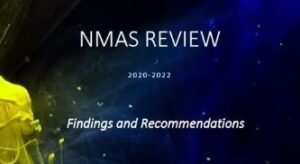
The consultation phase of the independent review of the Australian National Mediator Accreditation System (NMAS Review 2020-22) was completed in May and Findings and Recommendations are now available.
The NMAS has been reviewed twice since its implementation in 2008. The Mediator Standards Board(MSB) share on their website that the most recent review was led by independent consultants (Resolution Resources). It utilised a well-established methodology that incorporated thorough consultation and culminated in a series of recommendations. The MSB will consider and decide upon these recommendations over the coming months.
Based on the results of extensive consultation with the mediation community, Danielle Hutchinson and Emma-May Litchfield from Resolution Resources have made three overarching recommendations and ten targeted recommendations designed to improve the NMAS. This blog post provides a summary of the overarching recommendations from their NMAS Review 2020-22 Findings and Recommendations report.
Overarching Recommendation 1
Consultation found that, for many mediators, mediation is a low-paid, insecure and low demand industry that is difficult to enter. There do not appear to be professional bodies or associations that represent or advocate on mediators’ behalf. Accordingly, Recommendation 1 is to determine the viability, including ethical implications, of progressing the status of mediation from “emerging profession” to “new profession”.
Overarching Recommendation 2
Although the NMAS is a respected brand, the consultation revealed the following concerns within the mediation community:
- there is a lack of clarity and understanding in relation to structure, nomenclature and terminology; the role of the MSB, particularly oversight and support; expectations for training, accreditation and development of practice. These concerns risk undermining the purpose of the NMAS in relation to promoting ‘quality, consistency and accountability of NMAS accredited mediators within the diversity of mediation practice in Australia’ and falling short in its attempt to serve as a document that ‘informs participants in mediation (participants) about what they can expect of an NMAS accredited mediator’;
- the complaints system does not meet the expectations of the community, as it is not integrated, does not account for the entire system and does not provide an avenue for independent review;
- there is a wide range of concerns related to diversity and inclusion, including diversity on the MSB; diversity and inclusion considerations in the NMAS are narrow; and concerns as to accessibility in relation to training and the provision of services; and
- the dispute resolution community exists beyond Australia and some considerations are worthwhile exploring to ensure the NMAS has global currency. For example, Australia is a signatory to the Singapore Convention; there is international appetite to professionalise the mediation industry; Australia distinguishes between mediation and conciliation, whereas internationally the terms are interchangeable in some contexts.
The original intention of the NMAS was as ‘a voluntary industry and self-regulated accreditation scheme’. In keeping with this, Recommendation 2 is to adopt a voluntary industry code which the reviewers have drafted, modelled on the Australian Competition and Consumer Commission Guidelines for developing effective voluntary industry codes of conduct. The Draft Code would restructure the existing NMAS to provide a coherent framework that incorporates the proposed modifications and changes designed to address the issues arising from the consultation.
Overarching Recommendation 3
The NMAS was pioneering and is held in high regard for its role in the development of mediation in Australia. Consultation has revealed that, over time, the following limitations have emerged:
- while facilitative mediation remains a critical touchstone, it does not capture all that is happening in the field, such as variation of practice in response to context and the evolution of practice;
- mediator practice is not homogenous and is becoming more heterogeneous. Further, a mediator’s approach is not always determined by the type of mediator with which they identify;
- although there are patterns across practitioner types, the approach to practice is varied. However, there are more similarities than differences across the field of non-determinative dispute resolution (NDR) practitioners. One similarity is that all types of practitioners – (including facilitative mediators) offer, to some degree, a range of information and guidance;
- there is a call for an expanded purpose of the NMAS, including the desire for specialisation to be recognised and an appetite from institutions and services beyond mediation to align themselves with the NMAS;
*there is a desire for training and accreditation to extend course length and scope; account for the diversity of practice; move beyond the minimum requirement for initial accreditation as practitioners advance in skills and experience; provide a pathway to advanced practitioner status; and provide support for new practitioners; and
- there is a mismatch between what can be achieved by participants in a short course of training and what is expected of practising mediators.
To address these limitations identified during the consultation, the reviewers have incorporated a modified version of the existing NMAS Practice and Approval Standards into the Draft Code’s training and accreditation framework (TAF). This provides a pathway from graduate to advanced practitioner status and scope to accommodate a variety of NDR practitioners, specifically family dispute resolution practitioners (FDRPs), conciliators and the potential for First Nations mediators. Accordingly, Recommendation 3 is for the MSB to Adopt the Draft Code’s TAF.
Comment
The Findings and Recommendations have been published on the MSB website and the NMAS Hub and I look forward to reading the Draft Code and other Supporting Materials once they are made available to find out more about the proposed modifications to the NMAS.
________________________
To make sure you do not miss out on regular updates from the Kluwer Mediation Blog, please subscribe here.


